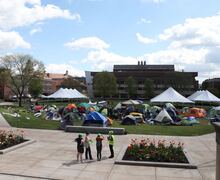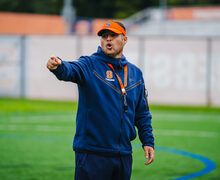Digital deception: With rise of online classes, SU considers how to prevent cheating
Natalie Riess | Art Director
Correction: In a previous version of this article, Dr. Margaret Usdansky’s comment on the legitimacy and challenge of online courses was misstated. Usdansky said one of the biggest challenges facing the online courses is how the programs translate into credentials and have value in the marketplace. The Daily Orange regrets this error.
At a March 19 University Senate meeting, associate math professor Steven Diaz brought up a pressing issue: How can Syracuse University maintain academic integrity in the digital age?
Diaz and other senators debated the issue in a discussion about how SU could improve teaching and assessment, especially as more schools, including SU, add online classes and Massive Open Online Courses. The discussion was a part of a larger report released by the Committee on Instruction last June, which outlined ideas for improving teaching methods, among other topics.
Diaz is concerned that as more classes become online based, more students will cheat to get the grade they think they deserve.
“I’ve heard through the grapevine of people who took a course and got credit for it and did nothing, they had a friend do the whole thing for them,” he said. “I just think that’s something you should be concerned about.”
But even though online education is surging, SU’s Academic Integrity policy has remained the same. The policy doesn’t distinguish the expectations of cheating for online and offline classes, said Margaret Usdansky, director of the university’s Academic Integrity Office. She said the same basic expectations would apply to both online and offline classes.
When the issue was initially brought up, there were no solutions offered, but Robert Van Gulick, chair of the Committee on Instruction, believes it is an issue that deserves attention. He said one concern is how MOOCs and other online classes affect academic dishonesty, including: if there are more ways to cheat, how to determine if cheating occurred and if people have more relaxed standards on academic honesty.
“And there’s some reason to think that when people are doing things electronically, people don’t regard it quite the same way that they do when they’re in person,” Van Gulick said.
Some people argue that online classes and programs aren’t as valued as a normal classroom setting. Even though people pay for online courses, Usdansky said online courses may not hold the same value as those taught in person. She said one of the biggest challenges in the chronicle of higher education is how online programs translate into credentials and have value in the marketplace.
There isn’t much data to prove the trend one way or another, but educators still feel that students have a lot of opportunities to cheat in online classes. Don McCabe, co-author of the book “Cheating in College: Why Students Do It and What Educators Can Do About It,” said it comes from students generally having a more laid-back view of cheating.
“Students have become looser in their definition of what constitutes cheating,” he said. “They justify certain online activities that they can’t justify when it’s a book. Students feel that working together isn’t a big issue anymore.”
There are multiple factors that go into why it may be easier to cheat in online courses than in physical courses. Part of the problem is the resources to cheat are so readily available, McCabe said.
“I think because they already have the mechanism there — they’re already online and they can just contact a neighbor very conveniently,” he said. “Any faculty member who’s watching should be able to see it occur, but I’m not sure anyone’s watching it closely.”
Usdansky said it’s increasingly important for students and teachers to communicate about what cheating is.
“There’s no question that instructors need to think about communicating to students what they do and don’t consider cheating and that likewise, students have a real need to make sure they understand instructor policies,” Usdansky said.
Another issue is the idea that online courses don’t allow for face-to-face contact. Van Gulick said if he has students in a normal classroom setting, he knows the students personally. With online classes, he said he wouldn’t have personal contact with students, raising the question of how he could manage the quality of their work.
There are also issues of isolation. In physical courses, there are students and professors that hold students accountable. With online classes, that doesn’t exist.
“Who’s going to catch you?” Diaz said. “It’s more isolated, so it’s less likely that without doing something with the technology, it seems like it’d be easier because there’s no one around with any concern for the course.”
In the long term, this issue could affect the way higher education works, making degrees less and less important, Diaz said.
When it comes to handling the policy changes that may come with online classes, that responsibility could fall on a variety of people.
Usdansky said that for SU, each school and college will be responsible for handling policy changes that come with adopting online courses and programs, including if they want to monitor online exams. Because of this, she said the protocol could be different for each course or program, since they all have their own unique structure.
“It’s a bit of a double-edged sword and a complicated question — how you want to do that and how far down that road you want to go,” Usdansky said.
Overall, SU faculty find that when some students cheat, honest students are also punished and that finding a way to reduce cheating in online courses will make it more fair.
Said Van Gulick: “We have an obligation to people who don’t cheat.”
Published on April 9, 2014 at 1:43 am
Contact Emma: [email protected]




